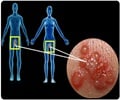Researchers have found an effective treatment approach to inhibit and keep latent herpes simplex virus from reactivating and causing disease.
Researchers have found an effective treatment approach to
inhibit and keep the latent herpes simplex virus from reactivating and causing
disease with the help of an existing drug, tranylcypromine (TCP), which blocked
a protein called LSD1 that plays a major role in the initiation of herpes
simplex virus infection.
Current treatments require active viral replication and
targets late stages of the infection, which has led to development of drug
resistance. This study took a different approach by targeting a drug, TCP, to a
protein that controls how genes are turned on and off, early in the viral
replication process. This epigenetic approach reduced symptoms and also reduced
shedding (i.e. release of virus particles which can transmit the virus even in
the absence of symptoms) and forced the virus to remain in a latent stage,
preventing its reactivation. Thus, indicating that even when a virus is not
active, drugs modulating epigenetic changes can still treat the infection.
This multi-institutional animal
study was conducted by late James Hill, PhD, LSU Health New Orleans Professor
and Director of Pharmacology and Infectious Disease at the LSU Eye Center, who
was the lead author for the study, Thomas M. Kristie, PhD, Chief of the
Molecular Genetics Section in the National Institute of Allergy and Infectious
Diseases' Laboratory of Viral Diseases, led the study, and also included
Timothy Foster, PhD, LSU Health New Orleans Associate Professor of
Microbiology, Immunology & Parasitology.
The study is published in Science
Translational Medicine.
Source-Medindia

 MEDINDIA
MEDINDIA




 Email
Email









